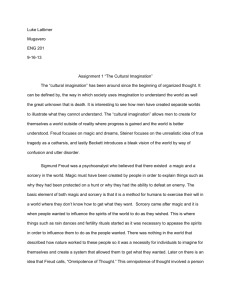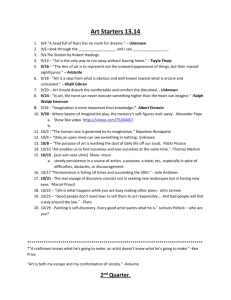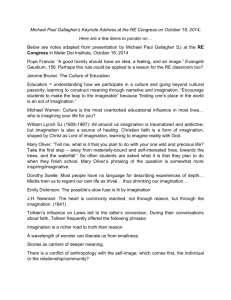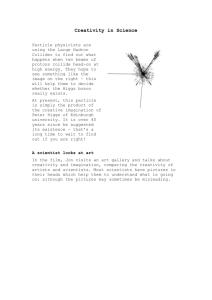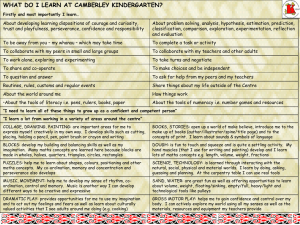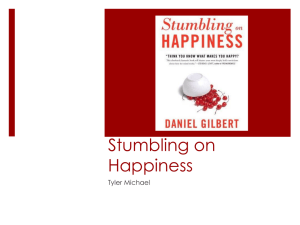Luke Lattimer
advertisement
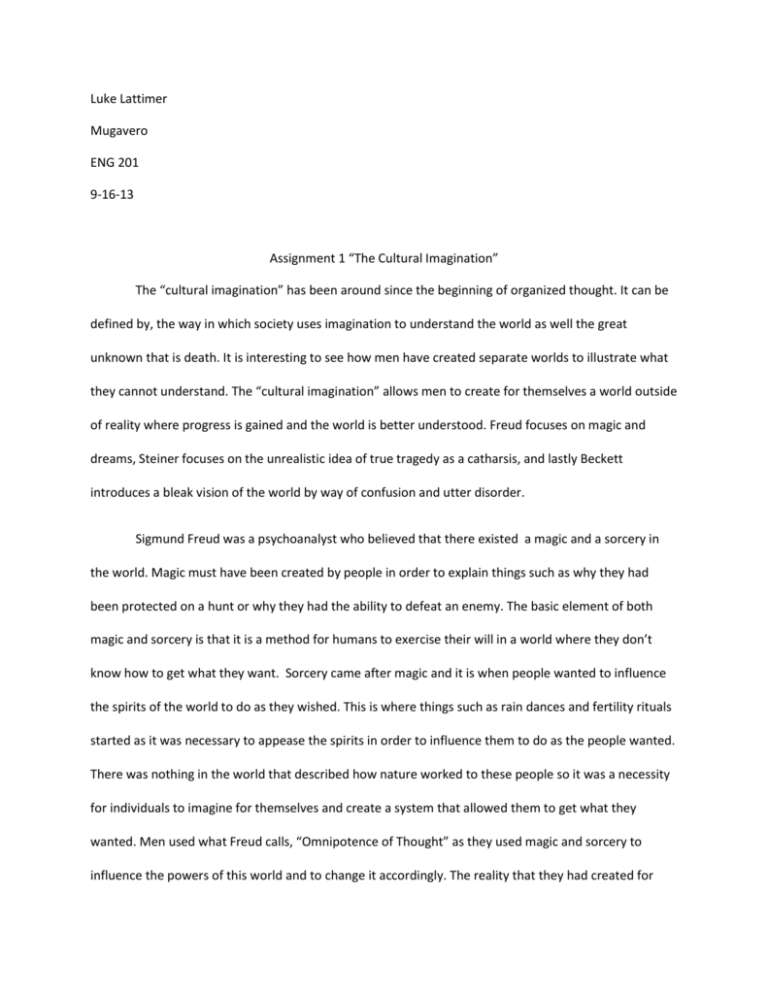
Luke Lattimer Mugavero ENG 201 9-16-13 Assignment 1 “The Cultural Imagination” The “cultural imagination” has been around since the beginning of organized thought. It can be defined by, the way in which society uses imagination to understand the world as well the great unknown that is death. It is interesting to see how men have created separate worlds to illustrate what they cannot understand. The “cultural imagination” allows men to create for themselves a world outside of reality where progress is gained and the world is better understood. Freud focuses on magic and dreams, Steiner focuses on the unrealistic idea of true tragedy as a catharsis, and lastly Beckett introduces a bleak vision of the world by way of confusion and utter disorder. Sigmund Freud was a psychoanalyst who believed that there existed a magic and a sorcery in the world. Magic must have been created by people in order to explain things such as why they had been protected on a hunt or why they had the ability to defeat an enemy. The basic element of both magic and sorcery is that it is a method for humans to exercise their will in a world where they don’t know how to get what they want. Sorcery came after magic and it is when people wanted to influence the spirits of the world to do as they wished. This is where things such as rain dances and fertility rituals started as it was necessary to appease the spirits in order to influence them to do as the people wanted. There was nothing in the world that described how nature worked to these people so it was a necessity for individuals to imagine for themselves and create a system that allowed them to get what they wanted. Men used what Freud calls, “Omnipotence of Thought” as they used magic and sorcery to influence the powers of this world and to change it accordingly. The reality that they had created for themselves within the realm of spirits and sorcery, was not reality according to science, however it was natural for the primitive men to associate these things together. Freud realized that it was only natural for them to make connections in their minds and to mistake these ideal connections about the world for real ones. The people created for themselves a system within the world that made sense to them so that there could be a basis for reality. Freud also theorizes about dreams and how they work in a person to express repressed emotions. The world of dreams is entirely made up of ideas that were once in the mind but were pushed away by morality and the standards of the current society. The world that is created is apart from reality because it is not correct for the emotions or actions to be expressed within the bounds of reality. The mind of a child represses and the mind of a more mature individual expresses, by means of dreams or even irrational behavior, what was repressed from an early age. It was Freud’s mission to unpack the unconscious and to find out why things such as this existed. It was the element of suppression that led to such behavior in reality. All stemming from the unrealistic desires that could not be expressed. Once these desires and passions are exposed it is then that Freud sees progress. Freud took dreams and he made them have meaning and a purpose within a system of thought could not have been recognized as anything important. The ideas that Freud illustrated within the realm of myths and dreams has brought about a people that is able to understand for themselves what is real. Even though there is science that has voided much of the myths it is important to realize how the mind makes ideal connections within itself for anything that is not fully understood. Everybody has a mind of their own with the ability to create and imagine anything so humans can progress at all times. Steiner wrote on the death of tragedy. Tragedy at one point in time was uniquely different from hardships that have been seen in stories such as that of Job. A real tragedy being something that results specifically from a small flaw usually in a man’s pride. This tragedy is inevitable, it cannot be avoided, and it cannot be explained by reason. The tragedy of Oedipus was unavoidable and yet it was caused by the pride in Oedipus. He lost everything and was totally defeated when he learns what he had done. One of the elements of the dramatic tragedy is the language that is used to incite the emotion of the story into the hearer. Great writers once used language to create emotion and new feelings in response to what they felt and believed in. They were able to arrange language in a way that was unique and impressive. Creation of language that came from a desire to express what they wanted to portray that had no way to be expressed. The writing of epics and stories from an alternate reality is extremely powerful and moving in all time periods. These came from a mythological reality that allowed the imagination to work freely and uninhibited. Today we live in a world that has deemed the existence of mythology to be a myth and this has caused the cultural imagination to severely inhibited. There is no longer room for creation and ingenuity because of the stricture that all society has been placed under from revelations from science. The imagination is less willing to go free when there is a science of reality that is understood as the only truth of nature. Great progress and creation was infinitely accepted and praised in a culture when there was little solid truth known. People were more accepting and willing to allow their mind to make connections freely instead of being placed in a mold of the current culture as is the case today. The greatest progress is possible and has occurred when the mind is uninhibited and the imagination is given free range to develop and create for itself. It is in the film, “Waiting for Godot,” that Beckett uses a very great disorder and confusion to shed light onto his bleak outlook on the world. Beckett created a world that is extremely unrealistic as the characters have no evident life yet they seem to have a vague understanding of the world and its functions. Through the world that Beckett creates there is no imagination and therefore no progress and hardly any perceived intelligence. It is tragic that they still find a way to stay and wait for Godot even though it has become quite evident that his arrival is not going to occur. The past life and memories have been almost completely erased or confused for the sole purpose of neglecting the past and looking to the inevitable future. The mythology and connection to one’s past that is seen throughout history does not exist as both Vladimir and Estragon have no clarity in the past. In contrast to the past there is the future that has a slight comfort and hope in the man named Godot. Man must submit himself to the continual passing of time. The two men want to kill themselves but they cannot even do this so the cycle of babble and repetitive time passing continues. Vladimir and Estragon are incapable of producing any kind of progress because they are unable to imagine. When they do imagine a place with Godot in a hay loft with food and a safe place to sleep, the two men find inspiration and a renewed hope to stay and wait another day for Godot. Exercising the imagination and using the mind to create, to think, and to produce ideal connections is what gives individuals the ability to progress. This ability within humans to organize language so that it makes sense and relays ideas to others is the element of life that the characters lack. Progress is essentially connected with the ability to exercise one’s imagination and to allow one’s mind to naturally decipher the natural world through connections in the minds imagination and predetermined images. This world is carried by the progress of people from an uncivilized state to civilized groups that have immense power and intelligence. How can this have occurred? Well the ideal connections of the mind connected the world with the works of ration and the mind to figure out problems, to learn to communicate, and even to express phenomena that has no natural connection. To create and to solve problems is a capability that surpasses all other forms of life that has ever existed. It is in using the imagination and looking into the world of the unreal that we can go past what is seen to create for ourselves systems to explain and solve problems that forever have and will exist in the world. Finding systems to explain nature. Explaining dreams that have little order and clarity. And finally creating alternate forms of reality to explain how the world can be viewed as repetitive and unclear when there is no recollection of the past in order to use it to move into a better future. Without the cultural imagination the world would never have progressed to where it is today.
